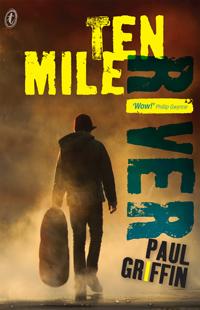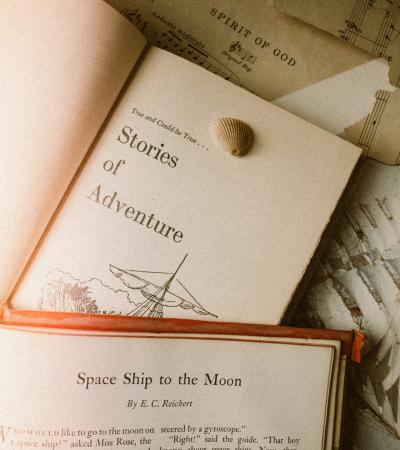On June 8, 2009, the ALA’s Great Stories CLUB sent me to Crossroads juvenile detention center in East New York, Brooklyn. ALA’s Lainie Castle put out a call to Penguin, my publisher, looking for the wonderful YA author Paul Volponi, to whom I am sometimes compared—a great compliment to me but maybe not so great for Mr. Volponi. Alas, Penguin’s author appearance coordinator, Emily Heddleson, said, “We don’t have Paul Volponi, but I can get you Paul Griffin. He will be more than happy to go.” And I was.

I started working with kids in juvenile detention twenty years ago, primarily teaching conflict resolution. Before that, my parents, both public school teachers, encouraged my brother, sister, and me to reach out to the incarcerated. We lived a half block from a state psychiatric center and took part in several initiatives aimed at pairing up patients with local families. I remember one kid in particular, an artist. He would come over for dinner and teach me to paint. “What’s your favorite animal?” he said. I shrugged, “Lion.” He painted me one. (That picture hung on my wall for many years, until I packed away my childhood and went off to college.) After dinner, I was free to run out and play stickball while my painter friend would be locked up for the night. A van would pick him up and take him back to the hospital, behind that barbed wire fence. I had a hard time wrapping my mind around the fact my friend, a fantastic artist, was confined to an institution where very few could share in his remarkable work.
The kids I met in Crossroads remind me of my painter friend. The boys, ranging in age from 11 to 16, are poets, R and B singers, rap artists, memoirists. They dream big. To maintain that kind of hope in confinement is no easy trick, I imagine, and the boys get incredible support from their teachers at Passages, a school devoted to juveniles in detention. Librarians Anne Lotito and Jessica Fenster-Sparber go all out to introduce the kids to books and authors. Assistant Principal Peterson, Site Superviser Wedderburn, Site Coordinator Godley, Department of Juvenile Justice Counselors Anderson and Melendez, teachers Ms. Webb and Ms. Newson, and the entire Crossroads staff are inspired and inspiring people—truly wonderful folks. They work tirelessly to break through to the kids, some of whom are inmates at Crossroads for several months, most others in and out in weeks and sometimes days. The inmate population constantly changing, the kids and their school support network have to adapt quickly. This resilience was on display in our workshops.
We briefly talked about Ten Mile River, a book I wrote and the boys’ assigned reading. Anne and Jessica and Ms. Webb and Ms. Newson spent a great deal of time helping the kids prepare for our visit, and the kids’ questions were wonderful. Largely the boys were curious about where the story, a novel about two boys on the lam from juvenile detention, came from. That discussion was our segue into a story slam, wherein the students created powerful, hard-hitting narratives reflective of childhoods spent, in large part, simply trying and failing to stay out of harm’s way. While we did not run from the boys’ pasts, the time had come to make the workshop future-focused. I suggested the boys try to get their stories out there.
When you are spending so much energy just trying to make it through the day without major incident, trying to get published is more than likely not at the top of your priorities list. While the boys are dreamers, they have a hard time accepting that their lives could, at some point, be about more than survival. That they actually might be able to make a living doing what they love seems unrealistic because they have no experience with this kind of success. When I told them I didn’t grow up rich or connected or particularly talented, yet I make a living telling stories, the looks I got ranged from incredulity to shock. Then they wanted to know how they might get their stories out there. I flipped the question back to them. The kids were sharp, extremely savvy about guerrilla marketing techniques. They said they would pass out flyers and make heavy use of online advertising avenues, particularly YouTube. At that point I introduced the idea that the boys might consider reaching out to agents and publishers with their compelling stories, emphasizing that their youth was not a liability but an asset. I suggested that while the publishing industry as a whole is having a hard time, the young adult market is hot, and stories like theirs would be sought after. One of the boys, fourteen, was well into a memoir. Is fourteen too young to start thinking about making a living doing what you love? Maybe not for kids who have been dodging danger most of their lives. At Lainie Castle’s request, I list here a précis of the very simple advice I shared with the kids.
• Find novels, memoirs, poems, albums, screenplays like the one you are working on. Who helped that writer get his story out there? Check the acknowledgements. One of the people being thanked, and usually right up at the top of the list, is the agent who sold that story.
• Get that agent’s address (ask your librarian to help you find it) and write that agent and any other agent who specializes in selling stories like yours. Keep your letter very short: who you are, why you are writing to this specific agent, why you are the person to write this book—e.g., Dear X, My name is Jaekwon, and I am writing to you from Crossroads juvenile detention center in Brooklyn, New York. I’m reaching out to you because Paul Volponi (or whomever the agent represents) is one of my favorites, and his writing inspires me. I wrote a novel about a kid who escapes from prison and becomes a word champion chess player. May I send you a few pages? Many thanks, Jaekwon Smith.
• Don’t even think about giving up until you have two hundred rejections. After that, take a day off to feel sorry for yourself, and then write another two hundred letters.
• Reach out to your librarians and teachers for help. Ask them to look over your letter and help you do research as to where you might send it.
To spend time with the kids and staff of the Passages school at Crossroads was a privilege. My friends there maintain a strong sense of humor in a challenging environment, and one leaves the facility hopeful. Anne Lotito is working on a project for the fall, one that will encourage the kids to write, and I told her I would be thrilled to help her with it in any way she sees fit.
As the kids were leaving the classroom, my friend the fourteen-year old memoirist told me that now that he knew how he might get his story out there, he couldn’t wait to get back to his writing. He wasn’t the only one, I think, given the sparkle I saw in some of the kids’ eyes. I was hoping two or three or maybe even more of the boys might pick up their pencils that night and write. Wouldn’t that be wonderful? A big thank you to ALA for letting me be a part of the Great Stories CLUB.



